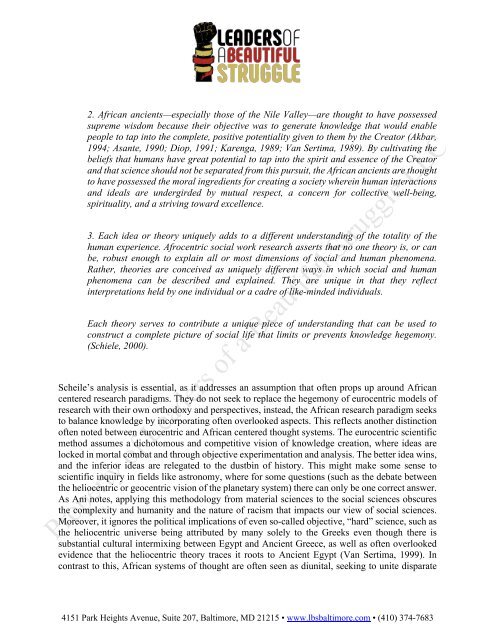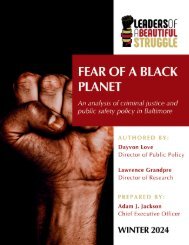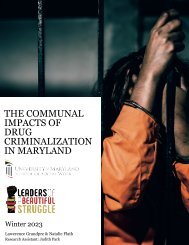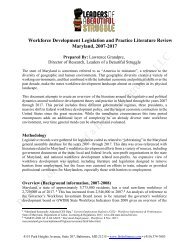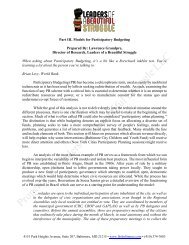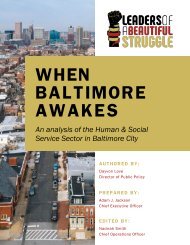Drug Decriminalization in Maryland Through an African Centered Research Paradigm- Analysis and Recommendations
This document offers guidance for theorizing questions related to a proposed research project purposed to advance drug decriminalization in Maryland.
This document offers guidance for theorizing questions related to a proposed research project purposed to advance drug decriminalization in Maryland.
- No tags were found...
Create successful ePaper yourself
Turn your PDF publications into a flip-book with our unique Google optimized e-Paper software.
2. Afric<strong>an</strong> <strong>an</strong>cients—especially those of the Nile Valley—are thought to have possessed<br />
supreme wisdom because their objective was to generate knowledge that would enable<br />
people to tap <strong>in</strong>to the complete, positive potentiality given to them by the Creator (Akbar,<br />
1994; As<strong>an</strong>te, 1990; Diop, 1991; Karenga, 1989; V<strong>an</strong> Sertima, 1989). By cultivat<strong>in</strong>g the<br />
beliefs that hum<strong>an</strong>s have great potential to tap <strong>in</strong>to the spirit <strong>an</strong>d essence of the Creator<br />
<strong>an</strong>d that science should not be separated from this pursuit, the Afric<strong>an</strong> <strong>an</strong>cients are thought<br />
to have possessed the moral <strong>in</strong>gredients for creat<strong>in</strong>g a society where<strong>in</strong> hum<strong>an</strong> <strong>in</strong>teractions<br />
<strong>an</strong>d ideals are undergirded by mutual respect, a concern for collective well-be<strong>in</strong>g,<br />
spirituality, <strong>an</strong>d a striv<strong>in</strong>g toward excellence.<br />
3. Each idea or theory uniquely adds to a different underst<strong>an</strong>d<strong>in</strong>g of the totality of the<br />
hum<strong>an</strong> experience. Afrocentric social work research asserts that no one theory is, or c<strong>an</strong><br />
be, robust enough to expla<strong>in</strong> all or most dimensions of social <strong>an</strong>d hum<strong>an</strong> phenomena.<br />
Rather, theories are conceived as uniquely different ways <strong>in</strong> which social <strong>an</strong>d hum<strong>an</strong><br />
phenomena c<strong>an</strong> be described <strong>an</strong>d expla<strong>in</strong>ed. They are unique <strong>in</strong> that they reflect<br />
<strong>in</strong>terpretations held by one <strong>in</strong>dividual or a cadre of like-m<strong>in</strong>ded <strong>in</strong>dividuals.<br />
Each theory serves to contribute a unique piece of underst<strong>an</strong>d<strong>in</strong>g that c<strong>an</strong> be used to<br />
construct a complete picture of social life that limits or prevents knowledge hegemony.<br />
(Schiele, 2000).<br />
Scheile’s <strong>an</strong>alysis is essential, as it addresses <strong>an</strong> assumption that often props up around Afric<strong>an</strong><br />
centered research paradigms. They do not seek to replace the hegemony of eurocentric models of<br />
research with their own orthodoxy <strong>an</strong>d perspectives, <strong>in</strong>stead, the Afric<strong>an</strong> research paradigm seeks<br />
to bal<strong>an</strong>ce knowledge by <strong>in</strong>corporat<strong>in</strong>g often overlooked aspects. This reflects <strong>an</strong>other dist<strong>in</strong>ction<br />
often noted between eurocentric <strong>an</strong>d Afric<strong>an</strong> centered thought systems. The eurocentric scientific<br />
method assumes a dichotomous <strong>an</strong>d competitive vision of knowledge creation, where ideas are<br />
locked <strong>in</strong> mortal combat <strong>an</strong>d through objective experimentation <strong>an</strong>d <strong>an</strong>alysis. The better idea w<strong>in</strong>s,<br />
<strong>an</strong>d the <strong>in</strong>ferior ideas are relegated to the dustb<strong>in</strong> of history. This might make some sense to<br />
scientific <strong>in</strong>quiry <strong>in</strong> fields like astronomy, where for some questions (such as the debate between<br />
the heliocentric or geocentric vision of the pl<strong>an</strong>etary system) there c<strong>an</strong> only be one correct <strong>an</strong>swer.<br />
As Ani notes, apply<strong>in</strong>g this methodology from material sciences to the social sciences obscures<br />
the complexity <strong>an</strong>d hum<strong>an</strong>ity <strong>an</strong>d the nature of racism that impacts our view of social sciences.<br />
Moreover, it ignores the political implications of even so-called objective, “hard” science, such as<br />
the heliocentric universe be<strong>in</strong>g attributed by m<strong>an</strong>y solely to the Greeks even though there is<br />
subst<strong>an</strong>tial cultural <strong>in</strong>termix<strong>in</strong>g between Egypt <strong>an</strong>d Ancient Greece, as well as often overlooked<br />
evidence that the heliocentric theory traces it roots to Ancient Egypt (V<strong>an</strong> Sertima, 1999). In<br />
contrast to this, Afric<strong>an</strong> systems of thought are often seen as diunital, seek<strong>in</strong>g to unite disparate<br />
4151 Park Heights Avenue, Suite 207, Baltimore, MD 21215 • www.lbsbaltimore.com • (410) 374-7683


